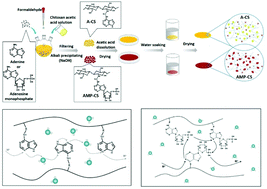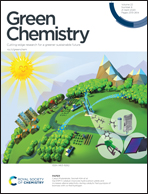Fabrication of highly proton-conductive chitosan whole-bio-membrane materials functionalized with adenine and adenosine monophosphate
Abstract
Chitosan-based membrane materials are promising biomaterials with excellent biodegradability, biocompatibility, high hydrophilicity, and cost efficiency. However, their low proton conductivity greatly limits their use as proton exchange membranes, and the previously reported methods to improve their proton conductivity generally introduced non-biodegradable groups and compounds, which caused this natural polymer to lose its basic advantage of biodegradability. In this work, a facile and efficient strategy has been developed for fabricating new chitosan-based whole-biopolymers to satisfy both sustainability and high-performance simultaneously. The modified chitosan with introduced purine groups has significantly improved proton conductivity up to 50 fold higher than that of chitosan itself, due to the unique structures of the grafted purine groups that produced a large number of proton-hopping sites, and the adenine monophosphate-grafted membrane materials exhibited higher proton conductivity (0.1867 S cm−1) at 100 °C than Nafion, indicating their capability for use in high-temperature fuel cells. Meanwhile their methanol permeability was much lower than that of Nafion (7.888 × 10−7 cm2 s−1vs. 1.550 × 10−6 cm2 s−1). Blending of NCC with modified chitosan further improves its mechanical properties and dimensional stability. This study paves a new way to prepare environmentally friendly membrane materials in the place of commonly used non-degradable membranes, highlighting the prospects of natural polymer-based membrane materials in the sustainable fields of fuel cells, supercapacitors and solid-state batteries.



 Please wait while we load your content...
Please wait while we load your content...